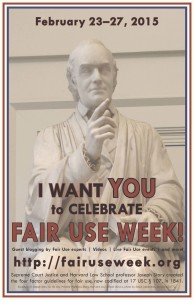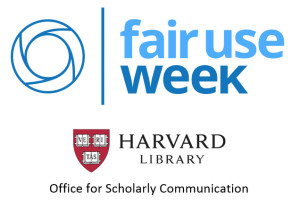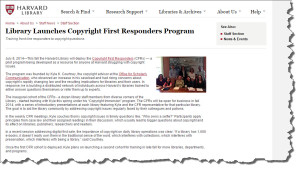Launching the 2nd Annual Fair Use Week
I am honored and delighted to celebrate the 2nd Annual Fair Use Week! What started as an idea generated from supporters of ARL’s Code of Best Practices in Fair Use for Academic and Research Libraries, launched as my “beta-test Fair Use Week” here at Harvard last year, has now become a nation-wide event!
Last year, when I launched the beta-Fair Use Week here at Harvard, we were fortunate to collaborate both with people from within Harvard and beyond. We discovered a real thirst for discussion and knowledge about one of the most important topics – fair use – that drives the teaching, learning, creativity, and scholarship in the United States. We had folks discussing fair use in the arts, music, archives, libraries, and journalism. We featured, in blog posts, the struggle for the introduction of fair use to other countries. We collected, on our Fair Use Stories Tumblr, stories from the world of art, music, film, and academia, which emphasized the importance of fair use in these communities. And we had experts weigh in on the many interesting decisions around fair use and libraries.
Copyright law affects the work of librarian’s every day. In fact, I like to say that “Every Day is Fair Use Day” in a modern, 21st century library. The majority librarians’ work deals with accessing, storing, exhibiting, or providing access to copyrighted material.
We are lucky in here in Massachusetts – our state was the venue, and some Harvard historians, librarians, and publishers were the first parties to be involved with a seminal fair use case in 1841. Justice Joseph Story, already a legendary American jurist, heard the case Folsom v. Marsh, outlining what was later to become the four fair use statutory factors. In 1994, in a case titled Campbell v. Acuff-Rose Music Inc., the Supreme Court established Story’s decision as the foundation of the modern fair use doctrine.
in here in Massachusetts – our state was the venue, and some Harvard historians, librarians, and publishers were the first parties to be involved with a seminal fair use case in 1841. Justice Joseph Story, already a legendary American jurist, heard the case Folsom v. Marsh, outlining what was later to become the four fair use statutory factors. In 1994, in a case titled Campbell v. Acuff-Rose Music Inc., the Supreme Court established Story’s decision as the foundation of the modern fair use doctrine.
In keeping with that historical narrative, Harvard Library has been on the forefront of providing a shared understanding through our Copyright First Responders programming, training librarians on concepts in copyright and fair use. Again, fair use is critical to the activities of libraries, supporting our broadest missions. An innovative 21st century library should have a robust understanding of fair use and the flexibility it provides to all our communities.
This year, with help from our partners world-wide, and Association of Research Libraries (ARL), we are continuing the conversation we started last year, and exploring fair use’s aspects through panels, blog posts, workshops, fair user’s stories, and a little bit of fun. Please follow the activities online at fairuseweek.org, see the stories at http://fairuseweek.tumblr.com/ and follow Twitter @FairUseWeek.
[P.S. A great thank you to Krista Cox (Association of Research Libraries) for coordinating the 2nd annual bigger and better Fair Use Week. And to Pia M. Hunter (University of Illinois at Chicago Library), and Brandon Butler (Practitioner-in-Residence at Glushko Samuelson IP Clinic, American University, Washington College of Law) who were the originators with the vision to host a week-long fair use celebration. Again, I hope our 2nd annual celebration matches part of your vision.]

